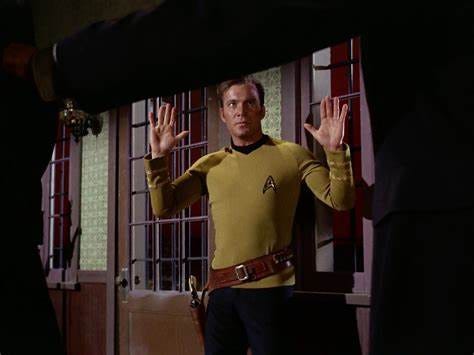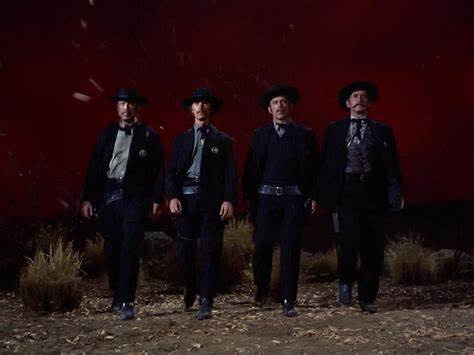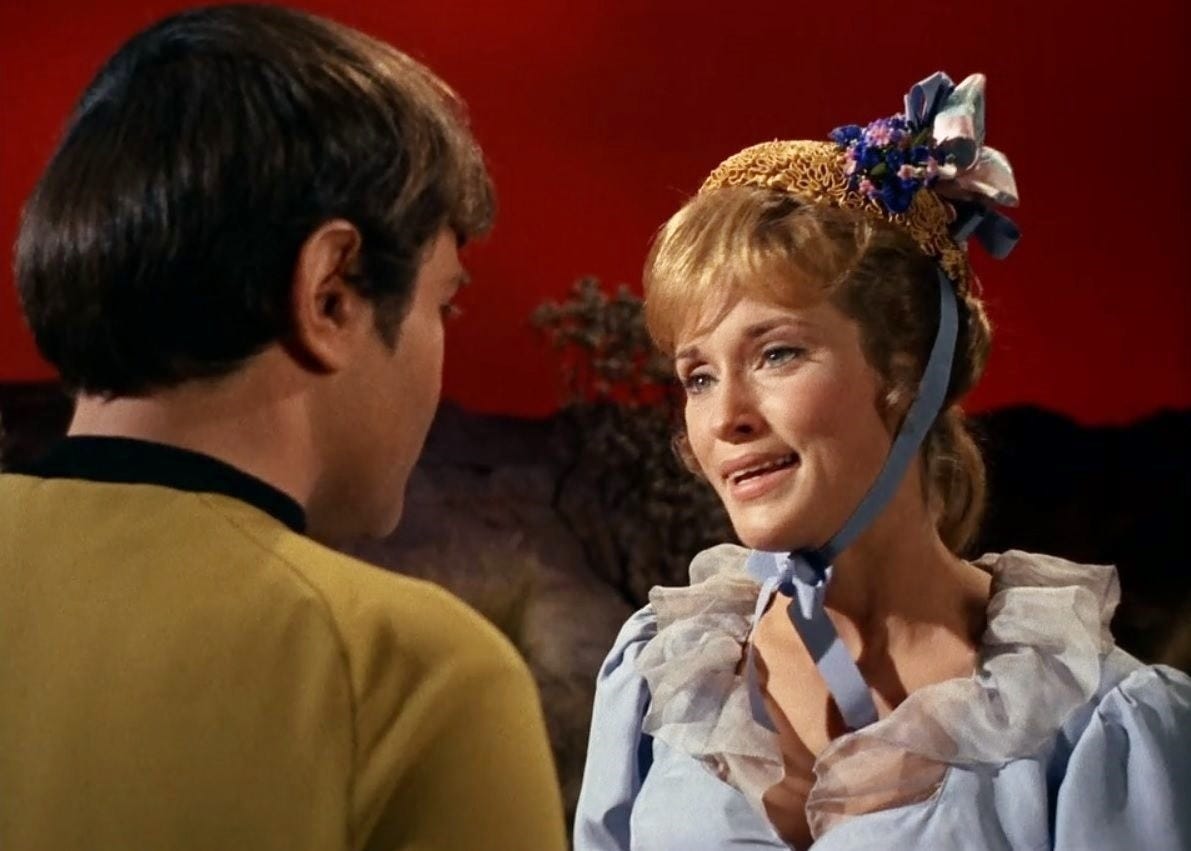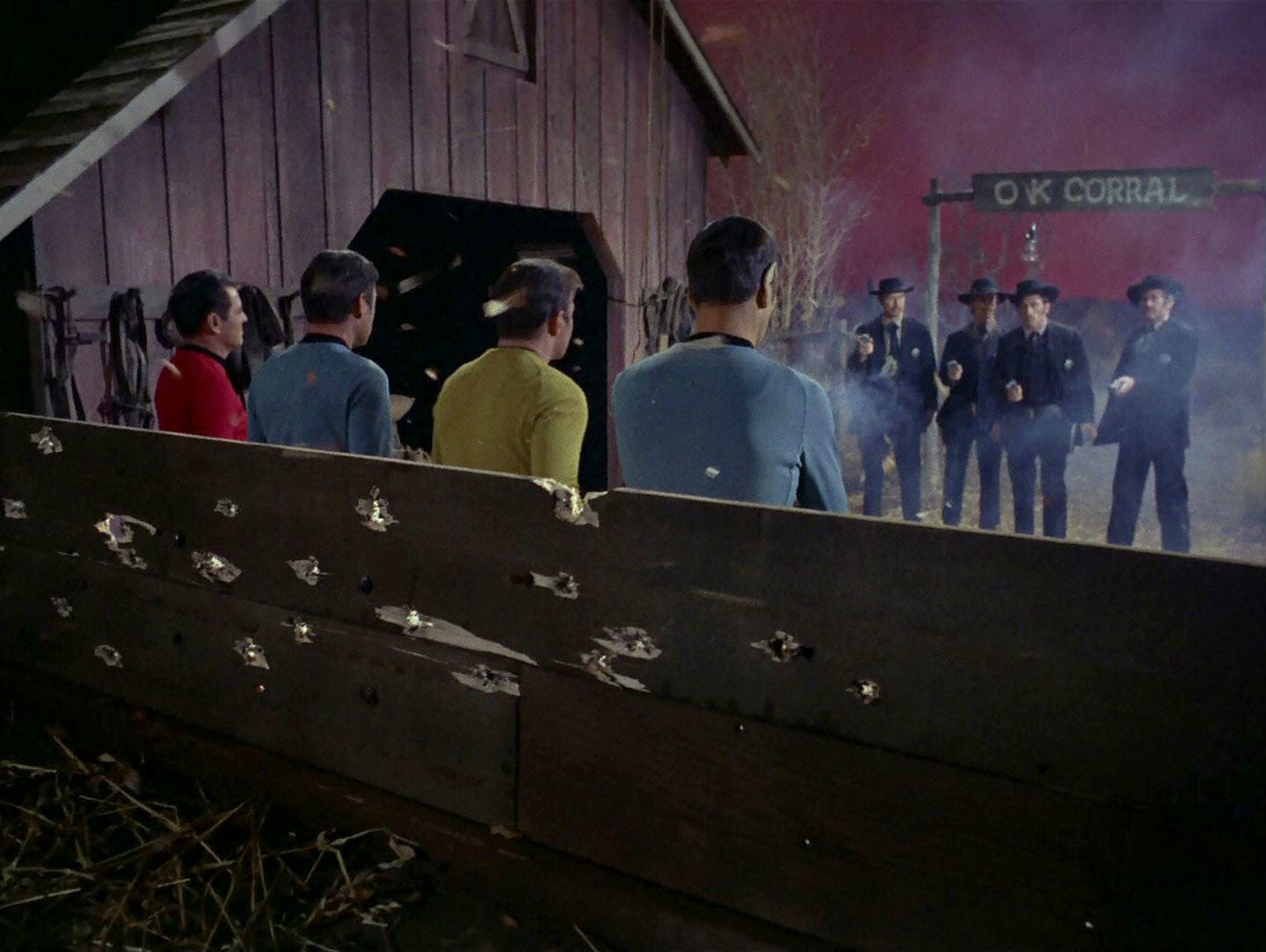We here at Where Many Have Gone Before have a confession to make. It was eminently foreseeable, prophesied, and voiced in warning. But Season 3 of Star Trek starts slow, boring, and bad. Outside of the intermittently entertaining “The Enterprise Incident” and “Is There No Truth in Beauty?” the opening run of Season 3 sweats through half-baked premises. It reuses past story structures in search of old magic, like in “The Paradise Syndrome,” and struggles under budgetary restrictions that keep the action either on-ship or off-screen, like in “Spock’s Brain.” “Specter of the Gun” is not immune from the show’s chronic late-period structural issues. But it works with and around those issues better than any episode of the season so far. No wonder it’s the work of a practiced hand.
Gene L. Coon ran Star Trek for its first two seasons. Besides Gene Roddenberry, there is no greater creative force behind the show. His contribution is largely unknown by the general public, possibly due to his untimely death from cancer at age 49 in 1973, far before the show became a cultural phenomenon. But Coon was a practiced television hand, helping pitch The Munsters to Universal and writing numerous scripts for Wagon Train, a television Western that Roddenberry cited as a key inspiration for his own spacefaring show. “Wagon Train in space” was Star Trek’s initial pitch. Suffering from burnout and frustrated by Roddenberry’s need for control, Coon quit the showrunning gig halfway through Season 2, but contributed four scripts for Season 3 under the pseudonym “Lee Cronin.” “Specter of the Gun” is the first of these. It is a knockout.
The Enterprise begins the episode attempting to make contact with the Melkotians, a reclusive race about which little is known. First contact goes poorly. The Melkotians tell the ship to leave without explanation. Kirk forges ahead and, upon landing on the planet with Spock, McCoy, Scotty, and Chekov, encounters the brain-like, fog-shrouded, imposing form of the alien. This arresting, evocative image leads directly into the opening credits.
The Melkotian emerges from the fog to warn the crew of what is to come. The design evokes a brain and stem, with piercing pupilless eyes indicative of its telepathic abilities. The alien was voiced by Abraham Sofaer, best known as the master of genies on I Dream of Journey, but who has lent his voice to Star Trek before. He voiced the similarly foreboding and seemingly omnipotent Thasian all the way back in Season 1’s “Charlie X.”
Not one for mercy, the Melkotian pronounces punishment for the crew’s disregard:
MELKOTIAN: Aliens. Our warning was plain. You have disregarded it. You shall be punished. You, Captain Kirk, the disobedience was on your orders. Yours is the responsibility. Yours shall be the pattern of your death.
KIRK: We come in peace, but we'll defend ourselves if necessary.
MELKOTIAN: You are outside. You are disease. The disease must be destroyed. Your plea has been heard, and sentence has been pronounced. It is done.
Without further warning, the crew immediately snap into a new place. They are dressed the same, but things are odd. The sky is blood red. They have revolvers on their belts. Their surroundings are half-built and mere facade. The surreal impression is one of an old Western town. A nearby sign dangles with the words “O K Corral.”
Morgan (Rex Holman), Virgil (Charles Maxwell), and Wyatt Earp (Ron Soble), along with Doc Holliday (Sam Gilman) confront the crew the only way they know how. Each of these actors cut their teeth on television Westerns in the 1950s and 60s, and they bring the look and attitude of the genre to bear in an episode that nevertheless requires almost nothing of them. They are an impeding force of death bearing down on the crew; each provides a fittingly flinty cold stare and demeanor.
The crew quickly learn that the Melkotian has cast them in a play. They are the Clanton gang on October 26, 1881. They are fated for death at the hands of the Earp siblings and Doc Holliday. This is the gunfight at the O K Corral.
It would be easy to dismiss this premise as nonsensical, and we would, were it not for how the setting is realized and framed. Faced with budget restrictions that prevented creating a whole Western town, director Vincent McEveety chose to construct the impression of a Western town and work such a look into the script. The Melkotians are imperfect telepaths, the setting is gleaned from the half-remembered cultural memories of the Enterprise crew, and the mood is uncanny and odd. Building fronts without interiors, missing walls and stairs, and the omnipresent pall cast by the deep red sky make for a foreboding and hopeless tone. At points, a massive clock appears in the sky to chime off the hours until the deadly shootout. The town, Tombstone, is so proudly unreal that it takes on meaning in the story. The Melkotians briefly scanned human minds and came away with a violent, bloody impression of the past. The world assumes that character.
Indeed, “Specter of the Gun” engages with the violent legacy of the American West explicitly. As the Melkotian tells Kirk, “Yours is the responsibility. Yours shall be the pattern of your death.” As the crew ponder their predicament, Spock works out the nature of their punishment:
SPOCK: Captain, the Melkot said you were the pattern. He looked into your mind and selected what he considered the proper time and place for our punishment.
KIRK: Because my ancestors pioneered the American frontier.
SPOCK: Yes. The violence of your own heritage is to be the pattern for our execution.
What a line. The Melkotians are a race of reclusive telepaths whose first impression of aliens is a human who carries a history of violent expansionary desire in his blood. Of course they are terrified. Star Trek presents a humanity that has grown beyond such impulses. But here, that past is a specter, made real and retributive.
Chekov flirts with Sylvia, who spends the whole episode fawning over “Billy Claiborne” and his bad Russian accent. Sylvia was played by Bonnie Beecher in her final credited on-screen role. Beecher was heavily involved in the counterculture and was an early Bob Dylan acolyte, even recording with him informally in Minneapolis before he moved to New York City. Her husband, Hugh Romney, goes by “Wavy Gravy” and was, no joke, the official clown of The Grateful dead.
Most of the episode concerns the crew’s attempts to diffuse the situation and avoid the inevitable shootout scheduled by history to occur at 5:00 PM. All of their attempts prove fruitless. No one believes that they are not the Clantons, as there are no real people around them. The sheriff is hapless. The Earps refuse to deescalate. Chekov is shot dead trying to defend the town’s only sex worker, who is fully smitten with him.
His death sparks an idea though, as his “character” in the Clanton gang survived the day’s events. History, it seems, can be changed. Spock and McCoy attempt to make a tranquilizer grenade in hopes of stalling the gunfight, but it proves ineffective despite ironclad chemistry. The failure, it turns out, is the crew’s salvation. As Spock notes, the world around them simply is not true. Physics, chemistry, and all physical laws are twisted or assumed. The Melkotians do not know how a gas grenade works, and thus it does not, in the same way that they hardly understand what a Western town is supposed to look like. They may be trapped in a hellish past, but the past is “nothing but the ghosts of reality,” as Spock puts it. If they all choose to believe the bullets are not real, the violence is not inevitable, then it cannot be so.
When the moment of the shootout arrives, the crew are instantaneously transported into the corral. The Earps appear, guns drawn. Thunder crackles, lightning flashes, and wind howls through the town as apocalypse approaches. Spock mind melds with his human friends to provide them with the proper will in a brilliant montage as the Earps arm themselves.
SPOCK: Unreal. Appearances only. They are shadows. Illusions. Nothing but ghosts of reality. They are lies. Falsehoods. Spectres without body. They are to be ignored.
The gun is not real. The bullet cannot hurt. And they do not.
Bullets harmlessly pass through our heroes. Rather than reenact one of the most famous instances of frontier violence in an elaborate action scene, “Specter of the Gun” uses the event as a thematic point: this past is best left understood rather than celebrated.
Reality is a choice, and the past is not the future nor the present. The crew disarm the Earps and appear back on the bridge, finding Chekov alive and well. Upon seeing this, the Melkotian is taken aback.
MELKOTIAN: Captain Kirk. You did not kill. Is this the way of your kind?
KIRK: It is. We fight only when there's no choice. We prefer the ways of peaceful contact. I speak for a vast alliance of fellow creatures who believe in the same thing. We have sought you out to join us. Our mission is still one of peace.
MELKOTIAN: Approach our planet and be welcome. A delegation will come out to meet you. Our warning threats are over.
The Enterprise moves ahead, at warp factor two, into the new future of humanity. Spock notes that after Chekov was shot, Kirk truly wanted to kill the Earps, and Kirk does not disagree. But he, like humanity, “overcame [his] instinct for violence.” “Specter of the Gun” is Star Trek at its most hopeful and clear, up there with “The Corbomite Manuever” in representing the show’s moral worldview. Through science-fiction plotting, the episode puts the future and the past into explicit violent conflict with each other, and rather than declare one the victor, notes that fighting is always a choice.
Stray Thoughts
When the crew first walk into the town saloon, Scotty of course requests scotch to drink. The bartender replies that he only has bourbon. Scotty drinks plenty of bourbon throughout the episode; practicality beats principle.








